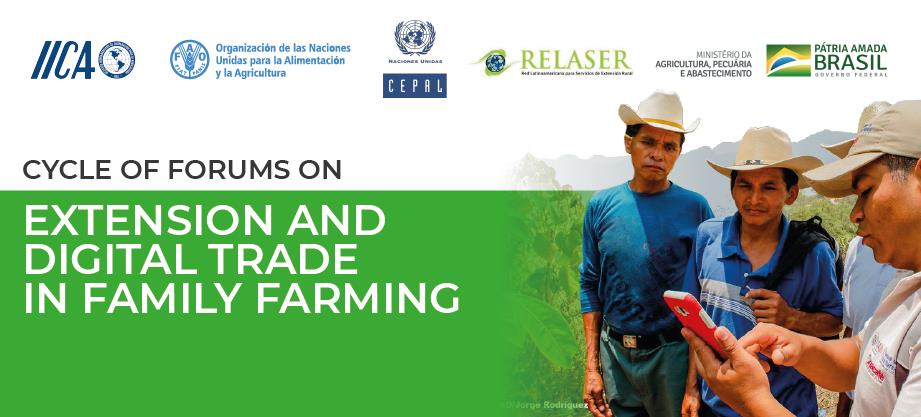Seminar series on the use of digital technologies for the provision of technical advisory services and marketing of family farming products: Experiences from Latin America and the Caribbean
Hybrid Event, 07/04/2021 - 28/04/2021

Launch of the fifth forum (April 28)
Fourth Forum (April 22)
Third Forum (April 20)
Second Forum (April 14)
First Forum (April 7)
1. Background
From various fields, for several years now, new strategies have been sought out and experimented with to expand the coverage and impact of the Technical Assistance and Rural Extension (ATER) services aimed at rural producers and micro and small businesses.
As a consequence of the COVID-19 pandemic, face-to-face service has been reduced, and the physical arrival of ATER technicians to agricultural properties has been nearly impossible. In addition, producers, especially the smaller ones, have faced many difficulties in marketing their products since the most common channels (direct sales in open markets or through government programs) were seriously restricted by containment measures and restrictions to circulation. In this new scenario, the use of digital tools to connect technicians and producers, as well as to promote and commercialize products, has expanded enormously, even without adequate planning and training, but providing valuable experiences that must be shared and evaluated.
During this period, ATER institutions (public and private) have used various digital tools (mobile applications, virtual conferences, short videos, SMS messages, distance education, among others) to maintain contact with producers. In addition, they have advised the creation and/or strengthening of digital channels to promote and achieve direct contact with the consumer. ATER is perhaps the area in which this digitization process is taking place the fastest. Spontaneous initiatives promoted by the extension agents themselves have played a very important role - especially through WhatsApp, Facebook, Twitter, and other social networks. The flexible nature of these networks allows messages and techniques to proliferate throughout the social base with more or less levels of structuring.
Strengthening and scaling the changes that have accelerating in response to COVID-19 requires designing new institutional models, supported by multiple actors, that can be applied in a decentralized way. In this sense, the Inter-American Institute for Cooperation on Agriculture (IICA), the United Nations Organization for Agriculture and Food (FAO), the Economic Commission for Latin America and the Caribbean (ECLAC), the Latin American Network of Extension Services (RELASER), and the Ministry of Agriculture, Livestock and Supply of Brazil (MAPA), join forces to deepen the discussion on this topic.
2. Objectives of the seminar cycle
• Share and discuss the opportunities, challenges, institutional models, and successful experiences of digital ATER actions at the level of farms and production chains.
• Share and discuss how digital channels can be a great tool for promoting and marketing the products and services of family farming.
• Generate the bases to strengthen a joint work of the institutions involved, complementing efforts and resources in the new post-COVID scenario that places new and greater demands.
3. Methodology
The Seminar Cycle has been structured in five events which will be virtual and organized according to geographical in April 2021. Two seminars will cover the region as a whole, one will focus on the Caribbean and two others on Brazil. Each event will feature prominent panellists and a selection of experiences to share and analyse, which will be organized in two blocks; the first one of an expository nature, and the second one aimed at generating an exchange between the participants.
Contact
Ricardo Rivera
Communicator
FAO Regional Office for Latin America and the Caribbean
Av. Dag Hammarskjöld #3241, Vitacura, Santiago of Chile
